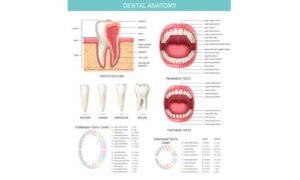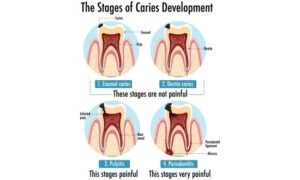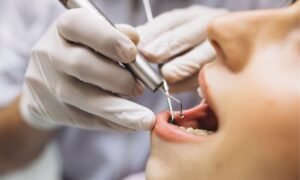Cavities on front teeth, also known as dental caries or tooth decay, are a common dental issue affecting individuals of all ages. These cavities can develop on the front teeth due to various reasons and may lead to discomfort, pain, and aesthetic concerns. Understanding the causes, preventive measures and available treatments for cavities on front teeth is essential for maintaining good oral health.
Tooth Anatomy and Cavity Occurrence
Human teeth consist of incisors, canines, premolars, and molars. While cavities frequently appear in molars and premolars due to their rough surfaces, front teeth can also develop cavities despite being easier to clean. Food particles, when not properly removed, can lead to cavity formation.
- Incisors are easier to clean but not immune to cavities.
- Most cavities occur in molars and premolars due to their rough surfaces.
- Despite being smoother, incisors can still develop cavities if oral hygiene is neglected.
How Cavities are formed?
Cavities develop when acids, sugars, and bacteria combine, forming plaque that attacks the tooth’s enamel. If left untreated, cavities can progress deeper into the tooth, potentially reaching the sensitive pulp chamber, causing pain and infection.
- Plaque buildup from acids, sugars, and bacteria leads to cavity formation.
- Cavities start superficially but can deepen and cause pain if not addressed.
- Neglected cavities can progress to infect the pulp, resulting in abscesses and severe pain.
Statistics About Dental Caries
- The WHO Global Oral Health Status Report (2022) estimated that oral diseases affect close to 3.5 billion people worldwide, with 3 out of 4 people affected living in middle-income countries. Globally, an estimated 2 billion people suffer from caries of permanent teeth and 514 million children suffer from caries of primary teeth.
- The National Institute of Dental and Craniofacial Research (NIDCR) reports that 92% of adults aged 20 to 64 have had cavities in their permanent teeth.
Causes of Cavities on Front Teeth
The reasons for cavities on front teeth are similar to those for cavities elsewhere in the mouth. Poor oral hygiene, sugary diets, medical conditions, and hereditary factors contribute to cavity development. In children, “baby bottle tooth decay” due to prolonged exposure to sugary liquids can lead to front tooth cavities. Some of the main causes of cavities on front teeth are:
- Poor Oral Hygiene: Inadequate brushing and flossing can lead to the accumulation of plaque, a sticky film of bacteria, on the front teeth, causing cavities.
- High Sugar Consumption: Regular intake of sugary foods and beverages can fuel the growth of bacteria in the mouth, contributing to cavity formation.
- Acidic Foods and Drinks: Acidic substances can erode tooth enamel, making it more susceptible to cavity formation.
- Dry Mouth: Reduced saliva production can hinder the natural cleaning of teeth, increasing the risk of cavities.
- Existing Dental Issues: Conditions like enamel defects or improperly aligned teeth may make front teeth more prone to cavities.
Prevention of Cavities on Front Teeth
Cavities on front teeth can easily be prevented by practicing following measures:
- Regular Brushing and Flossing: Brushing at least twice a day and flossing daily helps remove plaque and food particles from the front teeth, reducing the risk of cavities.
- Balanced Diet: Limiting sugary and acidic foods and opting for a balanced diet rich in calcium and vitamins supports strong tooth enamel.
- Fluoride Use: Using fluoride toothpaste and mouthwash strengthens tooth enamel, making it more resistant to decay.
- Dental Check-ups: Regular visits to the dentist for cleanings and check-ups help identify and address cavity-prone areas before they worsen.
- Dental Sealants: Applying dental sealants on the front teeth creates a protective barrier, reducing the risk of cavities.
Treatment Options for Cavities on Front Teeth:
Main aim of the treatment for cavities on front teeth is to remove decayed areas and restore the tooth’s structure and function. Several options are available, depending on the severity of the cavity:
A. Dental Fillings:
- Procedure: The most common treatment for cavities involves removing the decayed portion of the front tooth and filling the cavity with various materials.
- Materials Used: Dentists may use materials like composite resin, amalgam, ceramics, or glass ionomer to fill the cavities. The choice of material depends on factors such as the extent of decay, aesthetic concerns, and cost.
B. Crowns:
- Purpose: When cavities are large and severely compromise the tooth’s structure, a crown may be recommended.
- Procedure: Crowns cover the entire tooth to restore its shape, strength, and appearance. The process involves reshaping the affected tooth and placing a custom-made crown over it.
C. Root Canal Therapy:
- Indication: If the cavity extends deep into the tooth, reaching the pulp where nerves and blood vessels reside, root canal treatment may be necessary.
- Procedure: The dentist removes the infected pulp, cleans and disinfects the root canal, and seals it to prevent further infection. A crown is often placed after a root canal to protect the treated tooth.
D. Extraction:
- Last Resort: In cases where the cavity severely damages the front tooth and compromises its structure or if the tooth cannot be restored, extraction may be the only option.
- Procedure: The tooth is carefully removed, and options for tooth replacement (such as dental implants or bridges) may be discussed to maintain oral function and aesthetics.
Preventive Measures Post-Treatment
- After undergoing treatment for cavities on front teeth, maintaining good oral hygiene practices becomes crucial to prevent further decay.
- Regular dental check-ups and cleanings are recommended to monitor the treated tooth and address any potential issues early.
Factors Influencing the Choice of Treatment
Here are some of the factors that influence the choice of treatment for cavities on front teeth:
- Size and Severity of the Cavity: Determines the suitable treatment based on the extent of decay.
- Location of the Cavity: Specific treatments may be needed for front teeth to maintain aesthetics.
- Patient’s Preference: Some patients may opt for specific filling materials due to aesthetic concerns.
- Overall Oral Health: Dentists consider the patient’s oral health condition before selecting the appropriate treatment.
Why Prompt Treatment of Cavities on Front Teeth is Important?
While cavities in front teeth aren’t more serious than those elsewhere, timely treatment is crucial. Ignoring cavities can lead to further decay and complications. Seeking dental care promptly prevents the spread of decay and preserves oral health.
- Timely treatment prevents further decay and complications.
- Prompt dental care is vital regardless of cavity location.
- Avoiding delays in treatment preserves overall oral health.
When to Consult a Dentist for Cavities on Front Teeth?
Knowing when to see a dentist for cavities on front teeth is important for timely intervention and proper oral care:
- Visible Signs: If you notice visible holes, pits, white or brown spots on your front teeth, it’s advisable to schedule a dental visit.
- Tooth Sensitivity or Pain: Any sensitivity or pain experienced while eating, drinking, or biting down could indicate cavity development and warrants a dental check-up.
- Persistent Bad Breath: Unexplained bad breath, despite regular oral hygiene practices, might signal an underlying dental issue, including cavities.
- Regular Check-ups: Routine dental check-ups every six months can help detect cavities early, even before noticeable symptoms arise, allowing for prompt treatment.
FAQs
- Can cavities on front teeth be prevented?
Yes, regular brushing, flossing, a balanced diet, and dental check-ups can help prevent cavities on front teeth.
- Are fillings on front teeth noticeable?
Modern fillings blend in with natural teeth, minimizing their visibility.
- Do cavities in baby teeth affect permanent teeth?
Cavities in baby teeth can impact permanent teeth if left untreated, potentially affecting dental development.
- Are cavities on front teeth more painful than cavities in other teeth?
Pain from cavities depends on their severity and location, not necessarily on whether they’re in front teeth.
- How can I tell if I have a cavity on my front teeth?
Look out for signs like tooth sensitivity, visible holes or pits, pain when biting or chewing, or white or brown spots on the front teeth.
- Are cavities on front teeth more common than on other teeth?
Cavities are more common in pre-molars and molars but they can form on front teeth as well.
For any further query about this condition feel free to contact us at https://medicalinquiries.com/contact-us/
Conclusion
Cavities on front teeth, while less common, can occur due to inadequate oral care and diet. They can impact one’s oral health and overall well-being. Practicing good oral hygiene, making healthy dietary choices, and regular dental visits are essential for preventing and addressing cavities on front teeth. Early detection and timely treatment can help maintain a healthy and confident smile.
Disclaimer
Content on this site is written with thorough research and keeping in mind the latest guidelines. However, no content on this site should substitute professional consultation.

Thanks for sharing. I read many of your blog posts, cool, your blog is very good.
Thank you so much for your kind words! I’m glad you enjoyed my post. I have many other blogs you can read, and I’d appreciate it if you could share them as well!